If you are looking for the best blogging platform to start a successful blog and make money from it, you come to the right place.
There are so many blogging platforms out there with their own strengths and weaknesses. Additionally, the monetization potential of one can be vastly different from another.
Therefore, in this guide, we’ll honestly review the most powerful blogging platforms on the internet and help you choose the best one to start a money-making blog successfully.
In a rush? Jump straight to our final verdict.
What to look for when choosing the best money-making blogging platforms
It’s imperative to know all the key factors of a money-making blogging platform, so you can better decide which one is right for your business.
Easy to set up
An easy-to-set-up blogging platform is the first factor you need to consider. Even if you are a tech-savvy individual, creating and installing all the necessary features for a blog all by yourself can be exhausting.
Additionally, having to do all the maintenance and upgrade work can distract you from your main purpose of starting a blog in the first place, which is to make money.
Therefore, It’s wise to choose a user-friendly blogging platform to help you quickly set up a blog and extend on it later if you wish to.
Easy to customize
A flexible blogging platform helps you easily and quickly adapt to the new trend.
For example, you might want to change your blog’s look and feel for a holiday to better fit in with the atmosphere. Then, after the holiday, you want to change the design to the old one. Achieving that is a piece of cake with a flexible blogging platform.
Easy to scale
You want to choose a blogging platform that can scale effortlessly with the growth of your blog. If, for some reason, a platform breaks down when handling too many people at once, you risk losing your new visitors as well as your current ones.
Easy to monetize
There are many elements involving making money blogging, including creating content, building email leads, growing traffic, setting up monetization models, and tracking results. Without a powerful blogging platform, it’s hard for you to do all of that effectively.
Easy to protect
Spamming, hacking, and DDoS are just some of the problems that bloggers have to deal with on a daily basis. If your blogging platform cannot help you handle these troubles, you risk losing all of your hard work.
18 best blogging platforms to make money
Now, let’s review the best blogging platforms to make money and why you should choose them.
1. Self-hosted WordPress
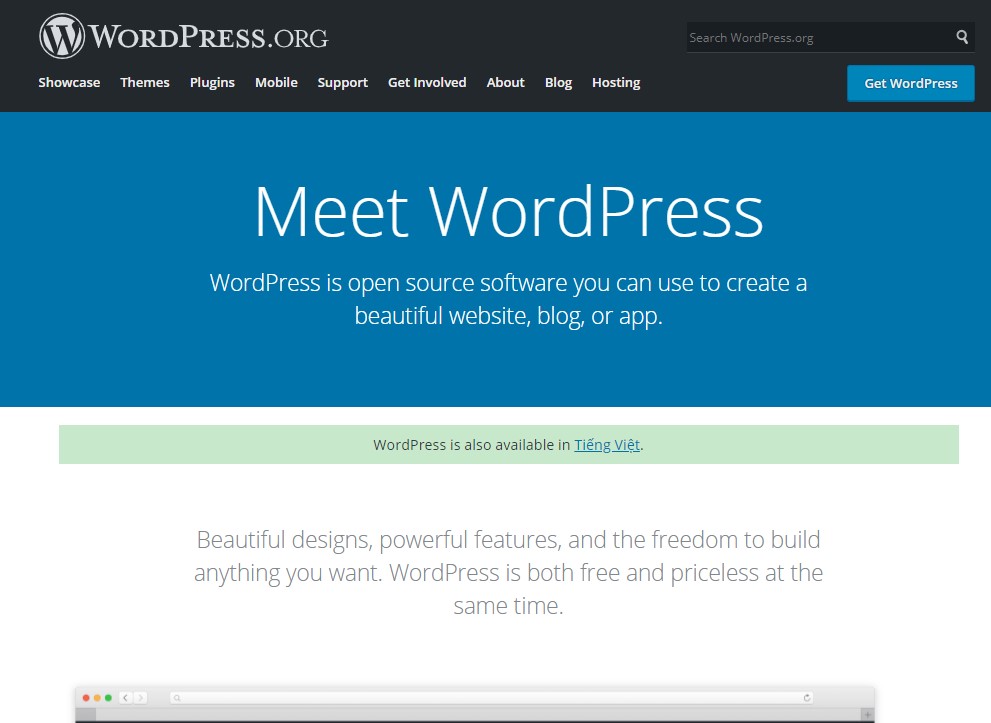
WordPress is a free content management system (CMS) that helps make the process of creating a website easier. It powers more than 38% of the websites and blogs on the entire internet.
Although being completely free, to make a WordPress blog come online, you still need to find a hosting service to run it on. This is why the term “self-hosted WordPress” is coined.
Key features
WordPress is a full-fledged software that allows you to do just about anything. You can freely customize the look and feel of your blog or even change the internal core of it as you wish.
Additionally, WordPress has great SEO (Search Engine Optimization), responsive design, high performance, and high security out of the box.
Ease of use
Generally speaking, self-hosted WordPress is relatively beginner-friendly.
Although it can get a little bit technical if you really want to customize every little part of your blog, WordPress still provides the ability to change your blog’s design or extend its functionality in just a few steps. This is achieved with the help of themes and plugins.
A theme is a ready-made template or design that can quickly change your blog’s look and feel but still keep the content like blog posts intact.
A plugin is a ready-made tool that you can install to extend WordPress functionality, ranging from analytics, managing emails, creating forums to building an online store within your blog.
With the help of those features, WordPress is suitable for both technical and non-technical users.
Custom domain name
It’s easy to have a custom domain name for your self-hosted blog since every WordPress hosting service allows you to create and connect one with just a few clicks.
Monetization potential
Almost every monetization model, such as displaying ads, managing affiliate links, or member subscriptions, can be done effortlessly with the help of various WordPress plugins or custom codes. Therefore, you can be sure that your self-hosted blog is always ready to make money.
Pricing
Like we have mentioned, WordPress CMS is completely free. However, you need to purchase a web hosting service to get your blog online. We recommend BlueHost as it’s one of the most powerful and affordable hosting services, which costs 3.95$/month.
2. WordPress.com
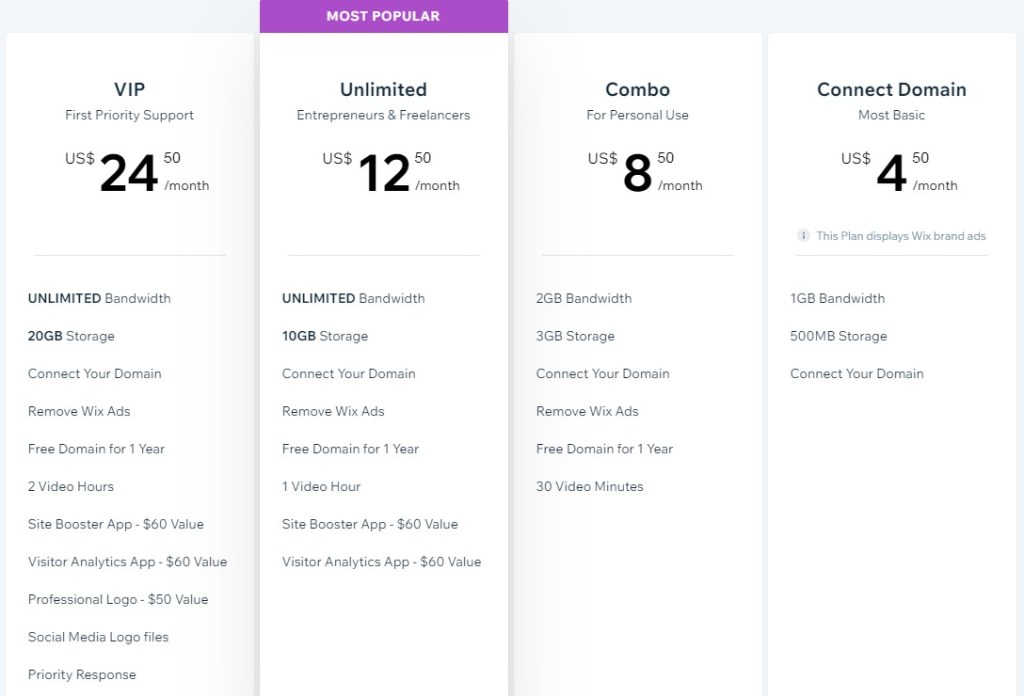
Many people get confused between WordPress and WordPress.com, and it’s for a good reason.
The term “WordPress” is a registered trademark name of the WordPress Foundation founded by Matt Mullenweg, who founded (and co-founded) both WordPress CMS and WordPress.com. WordPress.com’s purpose is to help you build a website like WordPress CMS, along with the same founder and same trademark, the confusion arose.
So, what is the difference between WordPress and WordPress.com?
Although WordPress.com runs on the core of WordPress CMS, it has been modified and customized to become more friendly to use. Using WordPress.com, you don’t need to worry too much about finding a hosting service, maintaining your server, or backing up your data. All of those things are taken care of by WordPress.com pretty well.
Key features
WordPress.com is essentially a WordPress CMS blogging platform, so there is nothing else much to say about it.
However, it’s important to know that since the platform is tailored to make things more beginner-friendly, some plugins cannot be installed for compatibility reasons.
Ease of use
Although it’s definitely easier to use WordPress.com than self-hosted WordPress, there might still be some parts that require a little bit of work to suit your needs.
Custom domain name
WordPress.com provides an out-of-the-box hosting solution with a custom domain name.
Monetization potential
Similar to self-hosted WordPress, you can easily monetize your blog to make money with the help of various ready-made tools and plugins.
Pricing
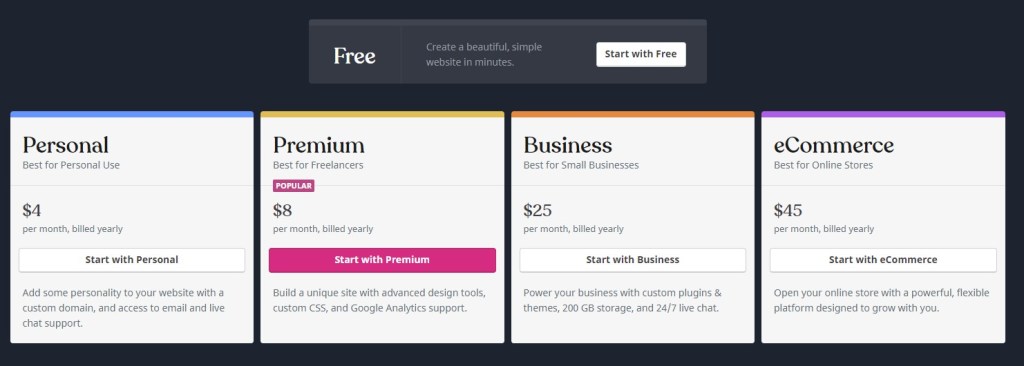
You can use WordPress.com for completely free with limited features.
To use your own domain name, you have to subscribe to the Personal plan, which costs $4/month.
Only when upgrading to the $25/month Business plan, you will be able to have access to advanced themes and install plugins.
3. Wix

If you love an intuitive blog building experience, Wix is your go-to choice. It’s a drag-and-drop website builder that is simple to use and super beginner-friendly. On top of that, Wix is famous for its ADI, the Artificial Design Intelligence that helps you automate the website building process just by answering a few questions.
With Wix, you can truly create your own stunning blog within minutes without any bit of technical coding.
Key features
Wix provides dozens of ready-made templates and free stock images to help you quickly get started and design on.
If you want to extend Wix’s functionality, you can install hundreds of third-party apps offered on the platform.
Ease of use
Wix is one of the most beginner-friendly platforms to get started blogging and make money.
However, compared to WordPress, Wix might lack some out-of-the-box advanced blogging features as a trade-off for the ease of use. You can install third-party apps to make up for this drawback though.
Custom domain name
Wix allows you to connect a custom domain name with a paid plan.
Monetization potential
You can monetize your Wix blog with ease like WordPress.
Pricing
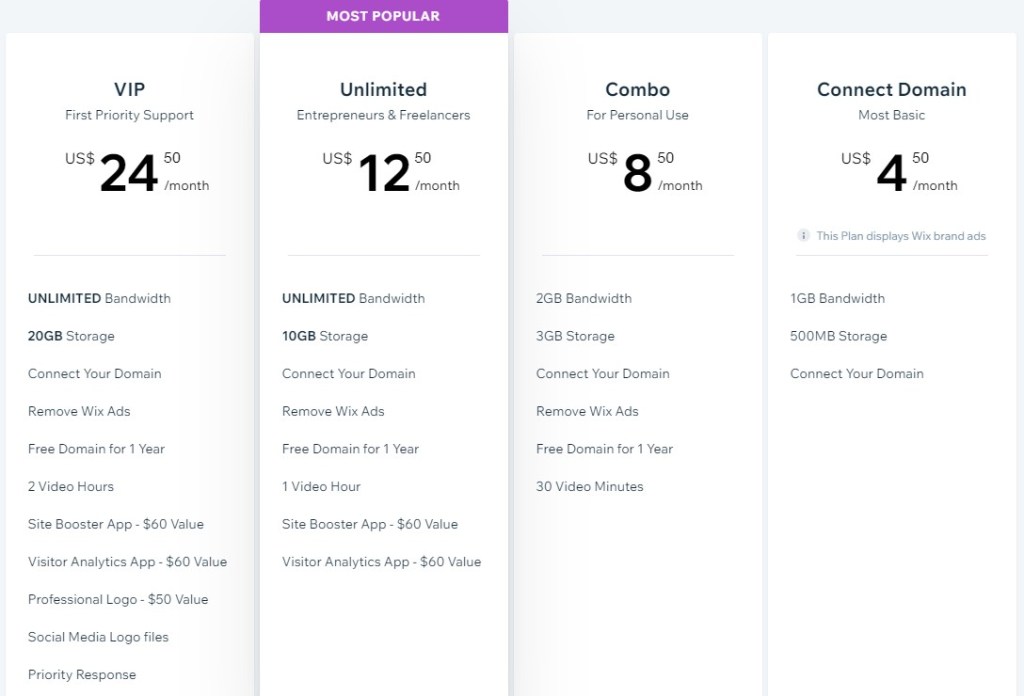
Wix offers a free plan so you can have a taste of how powerful it is. Starting from $4.50/month and going up to $24.50/month, you have access to more storage, more bandwidth, advanced apps, and priority support.
4. Constant Contact Web Builder

Constant Contact Web Builder is another platform that uses ADI to make the process of creating a website hassle-free. Although not as flexible as Wix, the platform is extremely suitable for people who want to start a professional blog with minimal fuss.
Key features
The main strength of the platform lies in its powerful eCommerce system and email marketing service. You can easily integrate a full-fledged online store into your website, manage your email list, and analyze many key statistics on the fly.
Regarding blogging, Constant Contact only offers basic functionalities. If you really want to make your blog posts visually appealing and stand out, WordPress or Wix might be a better option.
Ease of use
Constant Contact Web Builder is super beginner-friendly. You will never be overwhelmed by many options or features.
Custom domain name
The platform allows you to connect a custom domain name with a paid plan.
Monetization potential
If you intend to make money by opening an online store and using your blog content to promote your products, you should definitely try out Constant Contact. Other than that, the platform doesn’t really have an option to help you display ads or manage affiliate links.
Pricing
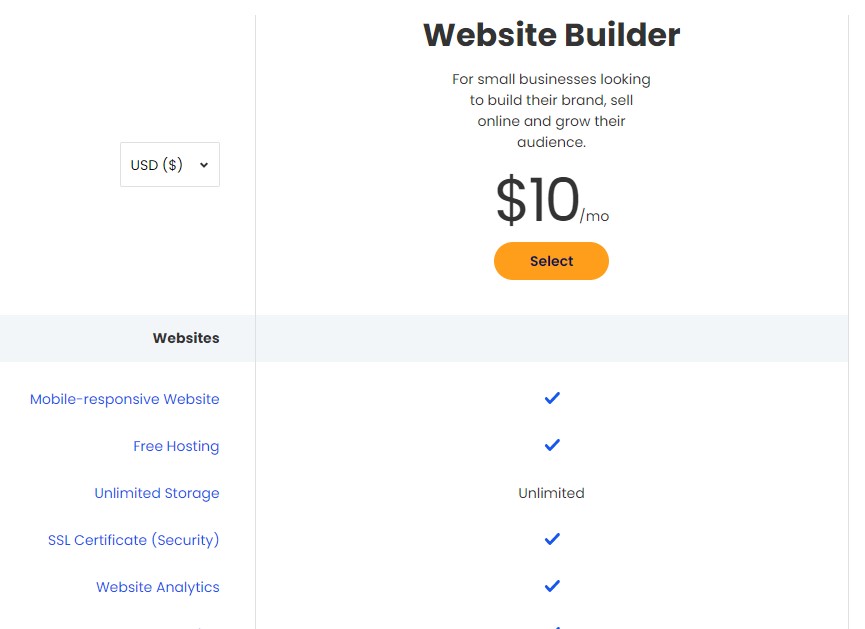
In terms of pricing, Constant Contact is really generous. You can use many of its features for totally free with no credit card required.
Subscribing to the $10/month plan lets you connect your own custom domain name and access to advanced Ecommerce and Marketing features.
5. Ghost
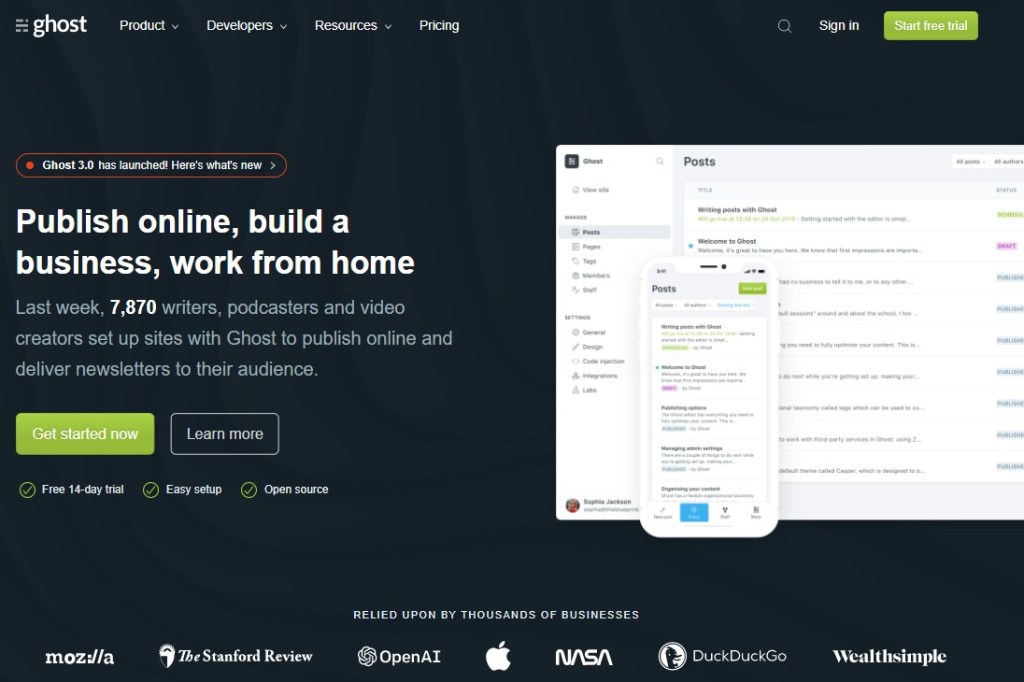
Ghost is a purely blogging platform geared towards more technical individuals. It offers a simple, clean, and modern blogging interface that makes the writing process fun and fast.
Key features
The platform is specially designed for blogging and made for blogging. It means that you have every tool you need to create a stunning, rich media blog posts and build a strong community around your blog right from the get-go.
Ease of use
Installing third-party apps into a Ghost blog requires a little bit of work. However, following Ghost’s step-by-step tutorials, you won’t have any trouble in the process what-so-ever.
Custom domain name
You can connect your own custom domain name either through a third-party hosting service or Ghost’s hosting service.
Monetization potential
Because Ghost’s sole purpose is blogging, you won’t be able to create something like a full-fledged online store. Apart from that, the platform allows you to make money by almost every other monetization models, such as displaying ads or member subscriptions.
Pricing
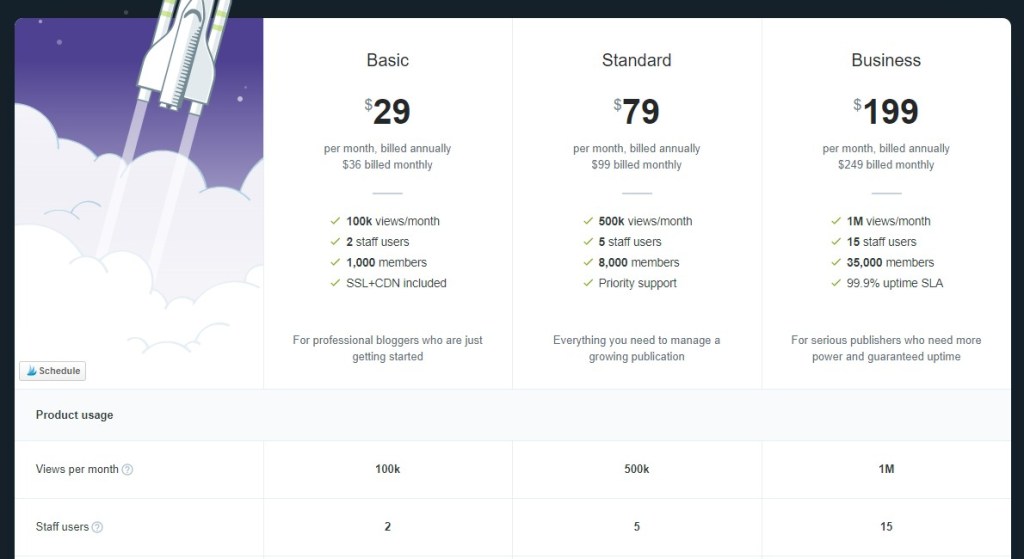
Ghost is a completely free blogging CMS. However, like self-hosted WordPress, you need a hosting service to bring your blog online.
There are 2 options for this. The first one is to use Ghost’s official hosting service, which starts at $29/month. It saves you a lot of time choosing, installing, and managing a hosting server yourself.
The second option is to host Ghost on a third-party hosting service. BlueHost is our recommendation.
6. Squarespace

Squarespace is another popular drag-and-drop blogging platform that packs with many robust built-in tools and award-winning templates. It’s suitable for people who want to have an optimized and elegant blog.
Key features
Besides many advanced Sparespace’s built-in tools like website analytics, eCommerce system, email marketing, or SEO tools, you can install a limited number of extensions to extend your blog’s functionality.
Ease of use
Squarespace is straightforward and easy to use. However, since the platform focuses on developing its in-house tools, it might lack some features that many other platforms have already offered with their third-party plugins. In this case, you might need to do some technical stuff to customize Squarespace further.
Custom domain name
Connecting your own custom domain name to the platform is possible by subscribing to one of its paid plans.
Monetization potential
You can monetize your blog by building an eCommerce store.
Regarding other monetization models, they require you to do a little bit of coding to have them up and running on your blog.
Pricing
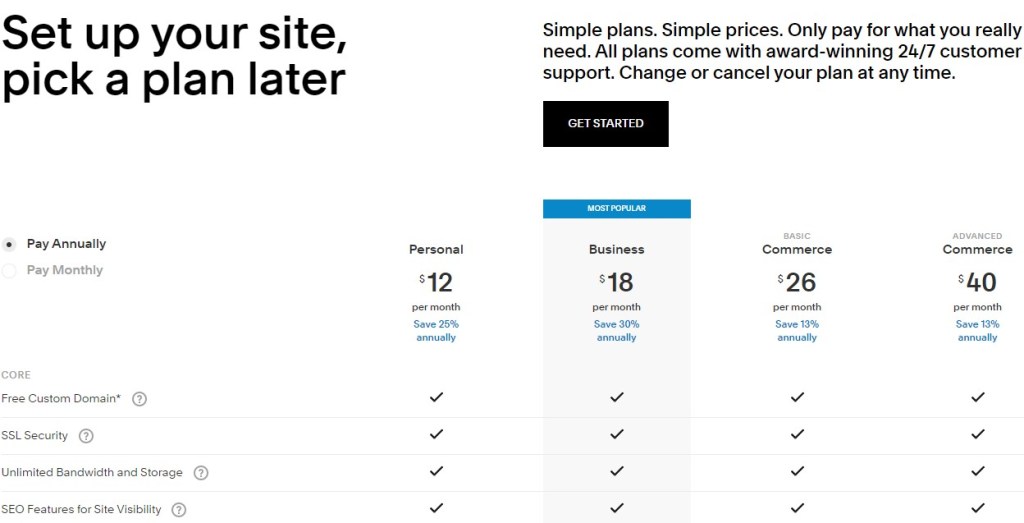
Squarespace starts at $12/month. Going up each plan lets you access to more advanced features and added benefits.
7. Blogger

Blogger is a blogging platform owned by Google. It’s a simple, free blogging solution for hobbyists who want to start a blog and make money on the fly.
Key features
The platform offers limited options for customization since it’s geared towards beginners and hobbyists. However, it syncs effortlessly with other Google products like Google Drive or Google Photos.
Ease of use
Blogger is one of the easiest platforms to start a blog on. You can literally create your online presence with it in a matter of minutes.
Custom domain name
You can buy a custom domain name through a third-party provider or Google domains and connect it to your blog.
Monetization potential
Since the platform is owned by Google, you can start displaying Google ads on your blog at any time to make money.
To implement other advanced monetization models like member subscriptions, you might need to do some coding.
Pricing
Unless you want to buy a custom domain name for your blog, Blogger is totally free.
8. Medium

Medium is a place for hobbyists, bloggers, writers, or even experts from big companies to share their opinions and ideas to a strong and healthy community.
Key features
With over 100 million monthly active readers and thousands of articles published each day, Medium is an ideal destination to both learn new things and start a blog.
However, since Medium is more of a publishing platform, you don’t really have options to customize your blog besides your name or your cover image.
Ease of use
It requires no setup what-so-ever to start a blog on Medium. You just have to create an account and start writing.
Custom domain name
You cannot connect your own domain name.
Monetization potential
There are a limited number of options to make money from a Medium blog, such as Medium partner program or affiliate marketing.
You can visit 5 Ways To Monetize Medium As a Writer to learn more.
Pricing
Medium is completely free.
9. Weebly
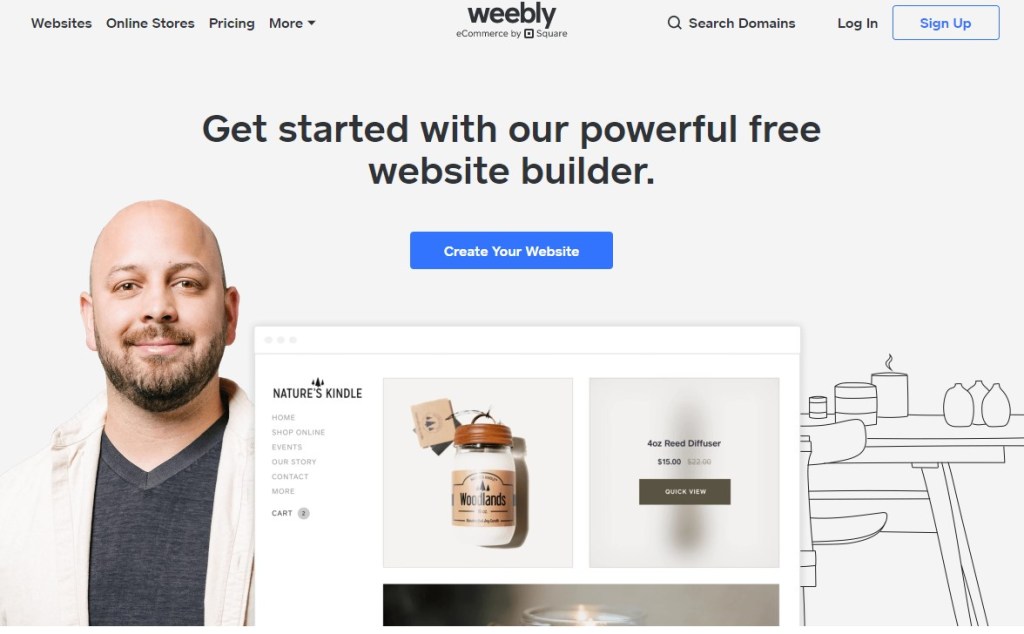
Similar to Constant Contact Website Builder and Squarespace, Weebly aims at providing the necessary tools for businesses to build a blog, along with managing an online store. It’s also relatively similar to Wix in terms of ease of use, freedom, customization, and extensibility.
Key features
Weebly offers beautiful and polished themes that are fully customizable through a drag-and-drop site builder. The process of creating an online is also made simple with the help of many advanced tools.
Another strength of the platform is its app center, which offers a wide variety of third-party tools that you can integrate into your blog.
Ease of use
The platform is beginner-friendly and easy to use.
Custom domain name
You can connect your custom domain name like other popular blogging platforms.
Monetization potential
You can easily monetize your blog through Weebly in-house tools or third-party apps.
Pricing
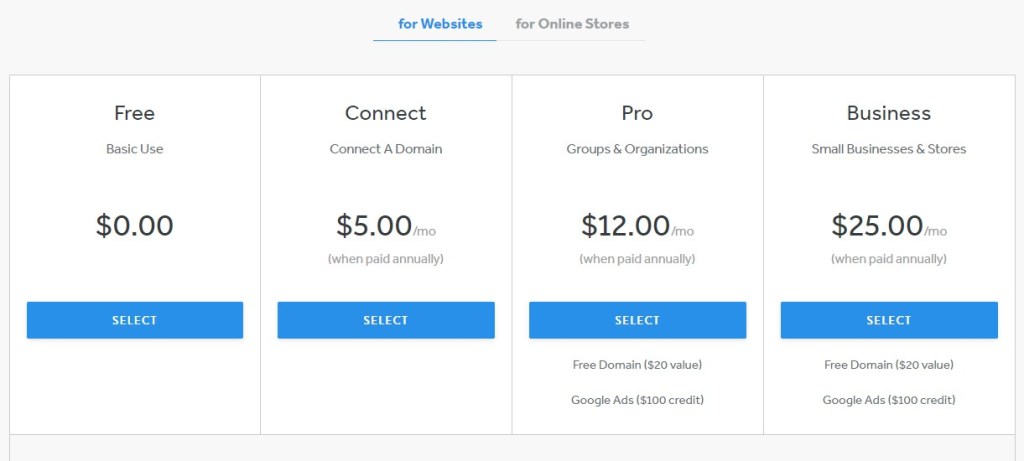
Weebly is free to use with limited features and limited storage. Starting from $5/month, you can connect your custom domain name. However, if you want to enjoy the power of Weebly, the $12/month plan is a better choice.
10. Write.as
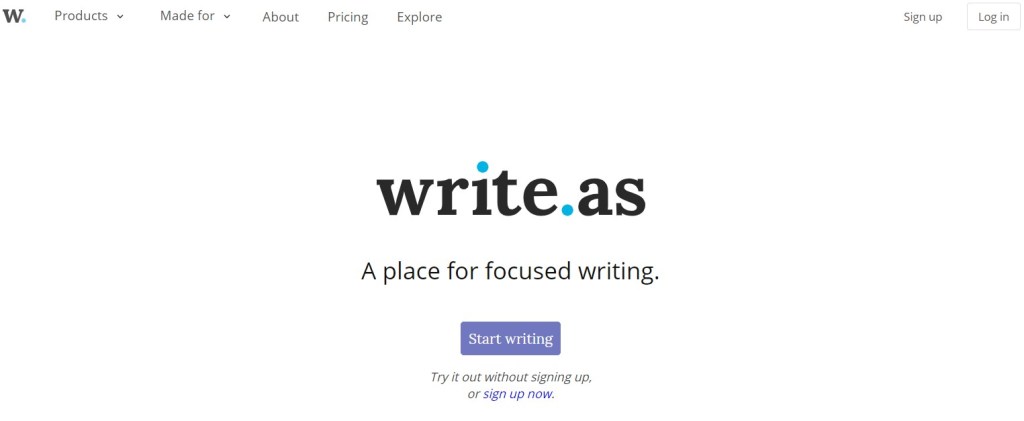
Write.as is a minimalist blogging platform that is ideal for writers who want a distraction-free writing experience.
Key features
Write.as offers a limited number of themes to choose from. You can also use custom CSS and Javascript to personalize your blog further.
Ease of use
It requires little to no setup to start a Write.as blog. However, you need to learn Markdown to format your posts.
Custom domain name
You can connect your custom domain name by subscribing to a paid plan.
Monetization potential
Besides doing affiliate marketing, the platform doesn’t provide you with an easy setup for other money-making models.
Pricing
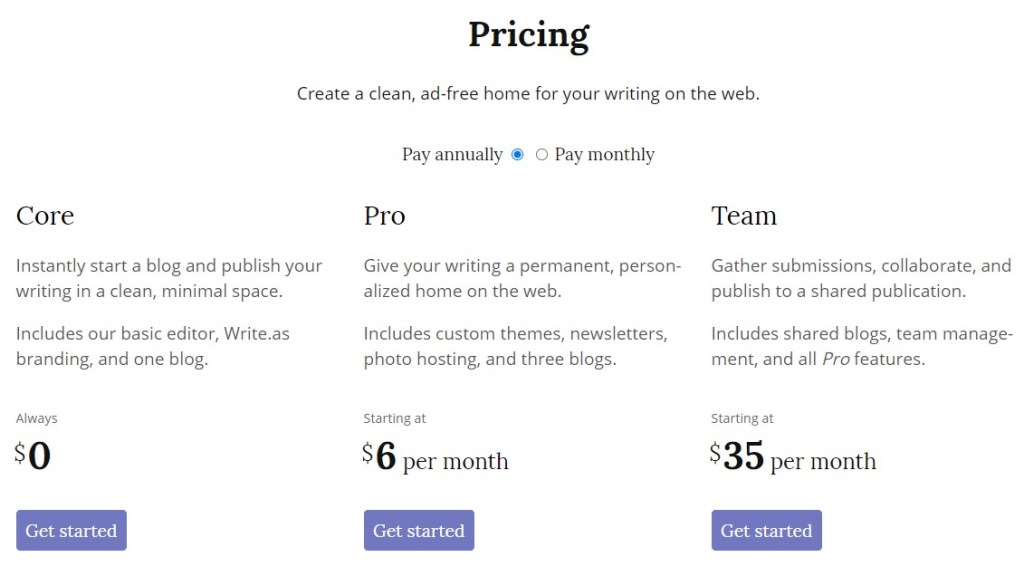
Write.as offers 3 pricing plans.
The Free plan gives you access to basic features like publishing unlimited posts or RSS feed.
The key difference between the $6/month Pro plan and $35/month Team plan is how many team members your blog can have and the ability to manage them.
11. Tumblr
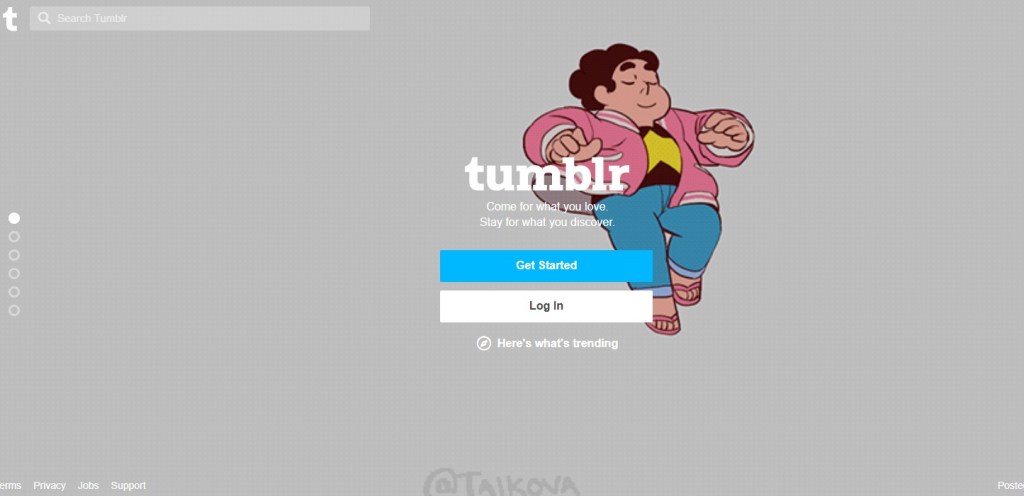
Tumblr is a combination of blogging and social media – a platform that lets hobbyists share eye-catching photos, videos, blog posts, and follow your favorite Tumblr sites.
Key features
Tumblr offers quite a few design options, including title, description, background color, font, buttons, header, and footer. You can also select from hundreds of beautiful themes to quickly change the look and feel of your blog.
Ease of use
It’s relatively easy to get started with Tumblr. However, to have complete control over your blog, you might need to do some coding stuff.
Custom domain name
It is possible to associate a custom domain name to your Tumblr blog.
Monetization potential
You can display ads or use affiliate links on your blog to make money.
Pricing
Like Blogger, Tumblr is completely free to use unless you want to have your own custom domain name.
12. Site123
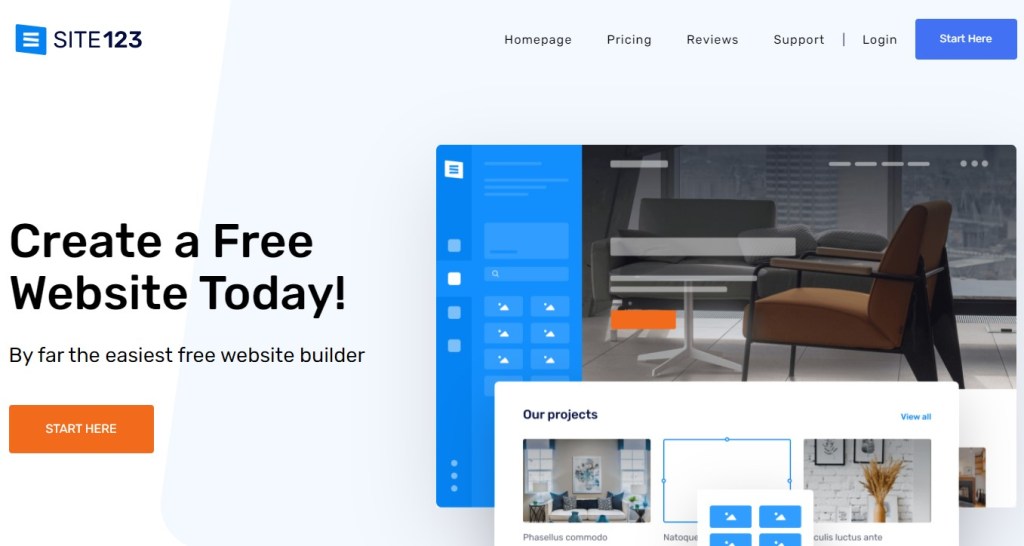
Site123 is a simple and clean blogging platform, offering a 24/7 live chat feature that will answer any questions you have in mind.
Key features
Compared to other platforms, Site123 lacks many advanced features that can truly make your blog stand out.
However, if you are just getting started, the platform should be able to fill your needs and set you in a good position in the blogging competition.
Ease of use
With a clean interface and the help of the live chat feature, the platform is perfect for beginners.
Custom domain name
Connecting a custom domain name is possible with a paid plan.
Monetization potential
Built-in tools and third-party apps can help you set up various money-making methods for your blog pretty effortlessly.
Pricing
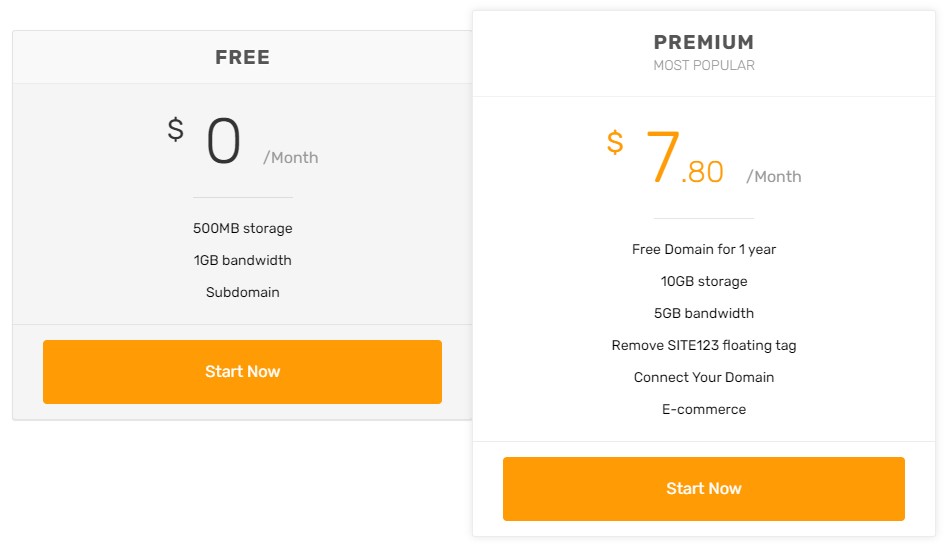
There are only 2 pricing plans. The Free one gives you 500MB storage and 10GB bandwidth. You have a free domain, more storage, bandwidth, and access to eCommerce features by upgrading to the $7.80/month Premium plan.
13. Strikingly
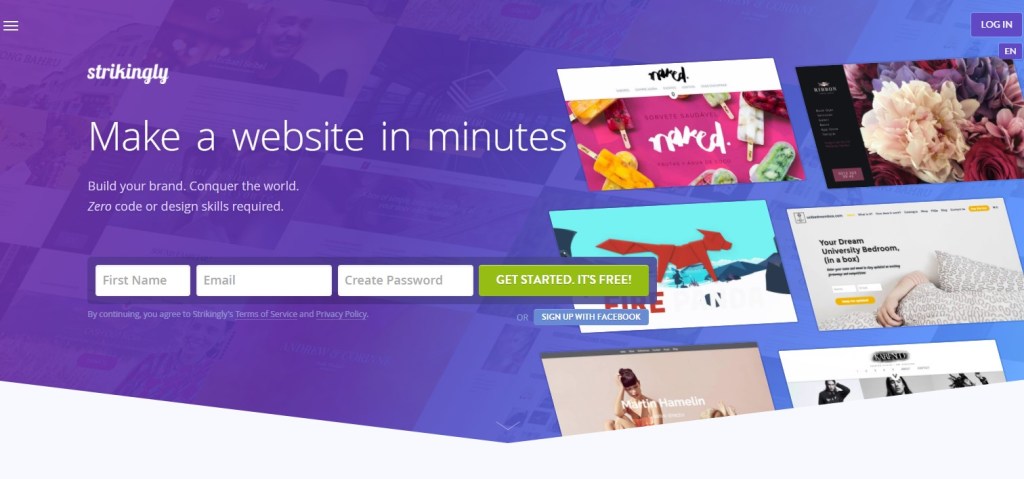
As the name suggests, Strikingly helps you build a striking blog in minutes. The platform is suitable for small businesses and entrepreneurs looking for a simple solution to showcase their work.
Key features
Strikingly offers various professional-looking templates to choose from. It also has built-in eCommerce, social feed, and analytics systems.
Additionally, the platform has an active app marketplace to help you extend the functionality of your blog. However, the lack of a wide variety of applications is one of the Strikingly’s weaknesses.
Ease of use
Strikingly editor is clean, well-organized, and easy to get familiar.
Custom domain name
With a paid plan, you can connect a custom domain name.
Monetization potential
Displaying ads, member subscriptions, or selling products are all well-supported by Strikingly.
Pricing
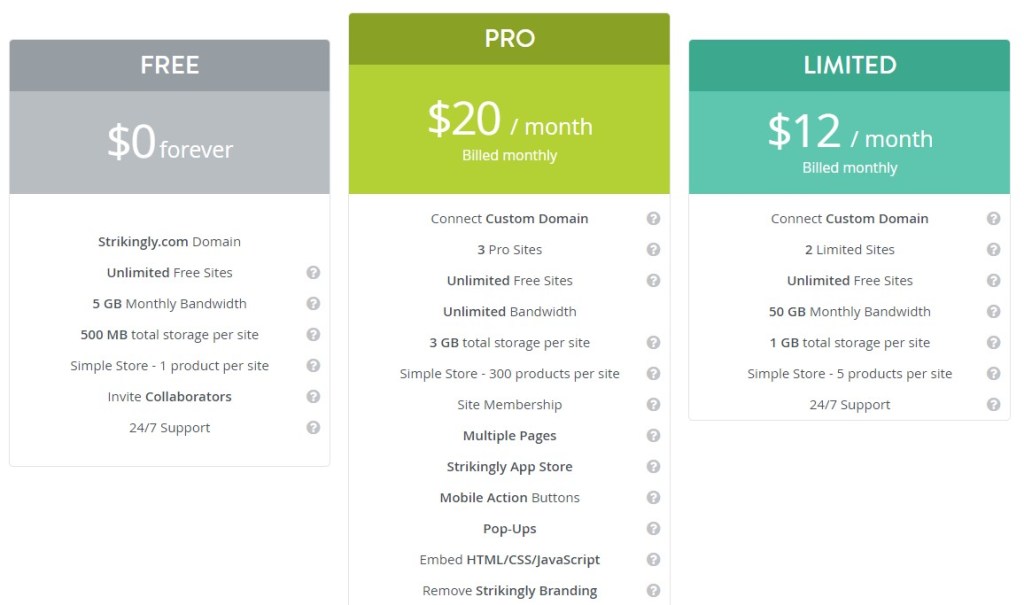
The Free plan is extremely limited, with the ability to add only 1 product to your site. It’s best to subscribe to the $20/month to access all of the features Strikingly has to offer.
14. Hubpages
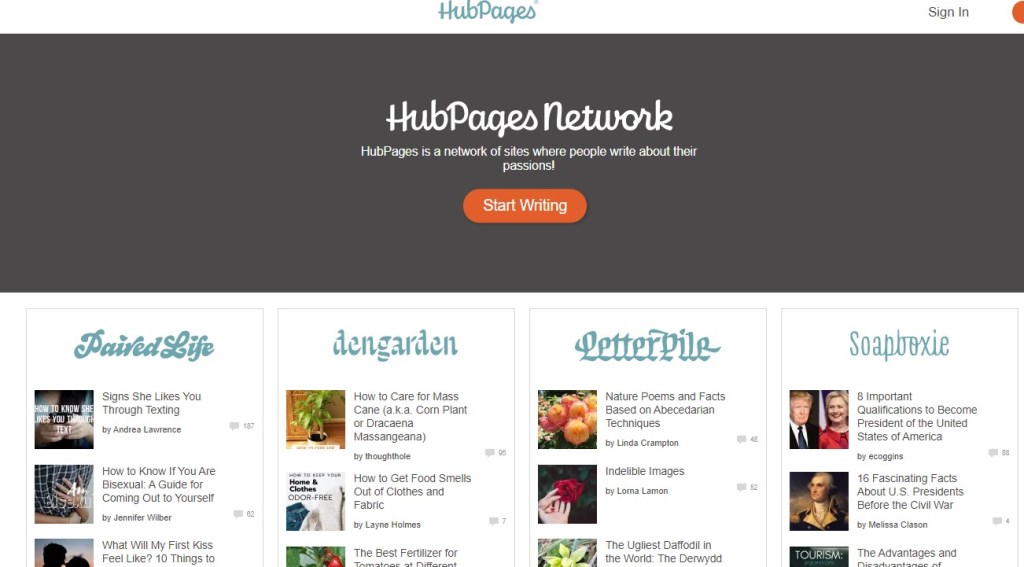
Hubpages establish itself as a “network of sites where people write about their passions.” It is a user-generated-content, revenue-sharing blogging platform, which basically allows you to publish articles in any given topic and share revenue through ads or affiliate links displayed on the website.
Key features
Hubpages has a monthly impression of over 24.7 million, so you can be sure to earn some cash writing blog on the website (not much, though).
Since you are tied to the Hubpages system, you have little to no control over your blog’s appearance.
Ease of use
Once you create an account, and all that’s left is writing.
Custom domain name
Using a custom domain name is not supported by Hubpages.
Monetization potential
Displaying ads and adding affiliate links are two common ways to make money through a Hubpages blog.
Pricing
It’s completely free to start a blog on Hubpages.
15. Joomla
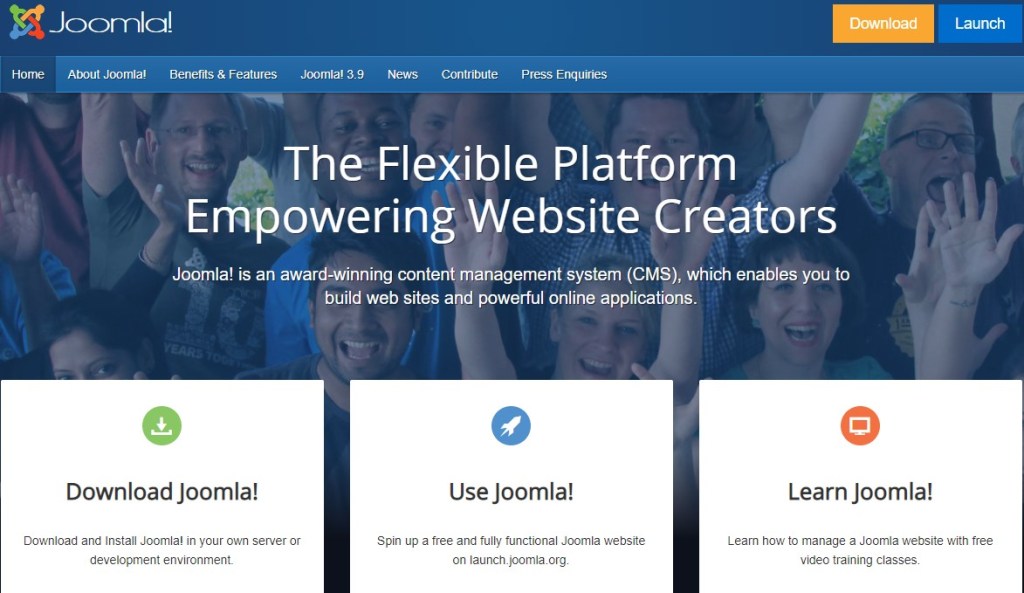
One of the best alternative CMSs to WordPress is Joomla, a flexible, search-engine-friendly, and fully extensible blogging system that has powered over 2 million websites.
Key features
Joomla offers more than 10 thousand extensions and templates to help you get started fast. Furthermore, the platform supports over 76 languages.
Compared to WordPress, Joomla is more well-suited for large and complex blogs and websites whose owners seek a reliable, flexible, and secure system.
Ease of use
Joomla requires you a fair bit of time to learn and install the CMS on a hosting service. It is also a bit harder to navigate than WordPress.
Custom domain name
Like WordPress, Joomla serves as an underlying system for your blog, so it has nothing to do with custom domain names. It means that you can freely connect one with whichever hosting service that supports Joomla.
Monetization potential
You can monetize your Joomla blog with any monetization models to make money.
Pricing
Joomla CMS is free. However, you need to host it on a web hosting service like BlueHost.
16. Drupal
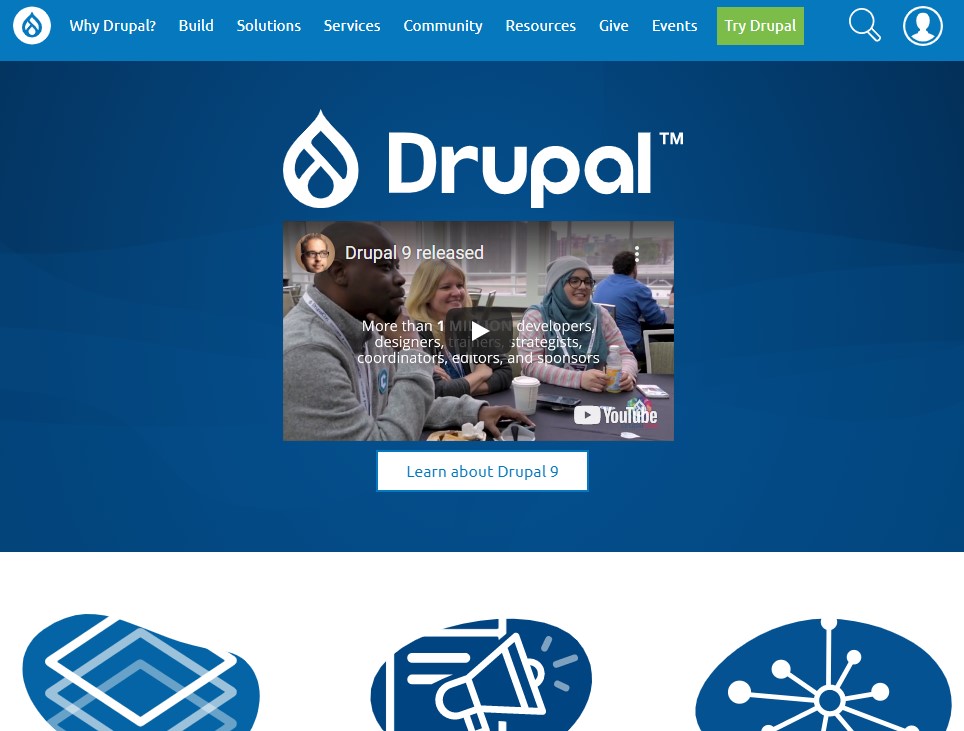
Another well-known free CMS is Drupal that provides reliable performance, excellent security, and great flexibility.
Key features
The platform is not only suitable for individual developers, marketers, and entrepreneurs, but also large agencies and organizations because of its extensibility, flexibility, and automatic scalability.
The Drupal community is one of the largest open source communities globally, with more than 1 million developers, designers, editors, and sponsors.
Ease of use
Drupal takes a fair bit of time to learn and familiarize yourself with various features it offers.
Custom domain name
You can connect a custom domain name with your blog using a Drupal supported hosting service.
Monetization potential
You can monetize your Drupal blog with any monetization methods.
Pricing
Like any other free CMS, you need to purchase a hosting service for Drupal. Again, we recommend BlueHost.
17. Webflow
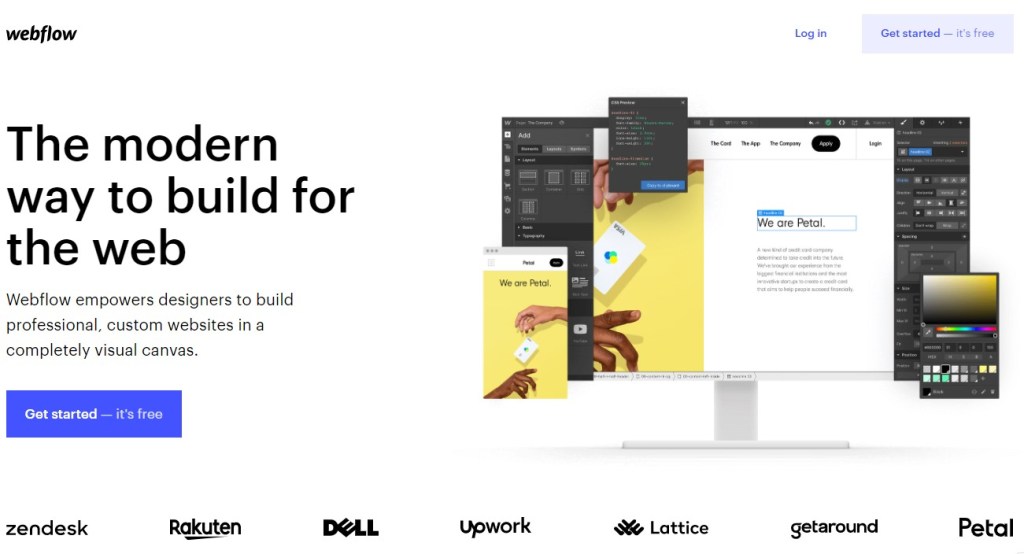
Webflow is one of the most highly customizable and full-featured blogging platforms on the market. It positions itself as a destination for designers and creatives to build a beautiful and flexible blog at the same time.
Key features
Webflow offers a robust drag-and-drop page builder with clean, semantic HTML5, CSS, and JavaScript.
The platform also has a powerful built-in CMS and animation system that helps you efficiently create and manage visually engaging, dynamic, and interactive content.
Ease of use
When it comes to using Webflow, there is quite a bit of a learning curve. However, after familiarizing yourself with the platform, you can start seeing how powerful it is.
Custom domain name
You have a custom domain name for your blog by purchasing a paid plan.
Monetization potential
With various integrations, you can comfortably enable numerous monetization models on your blog.
Pricing
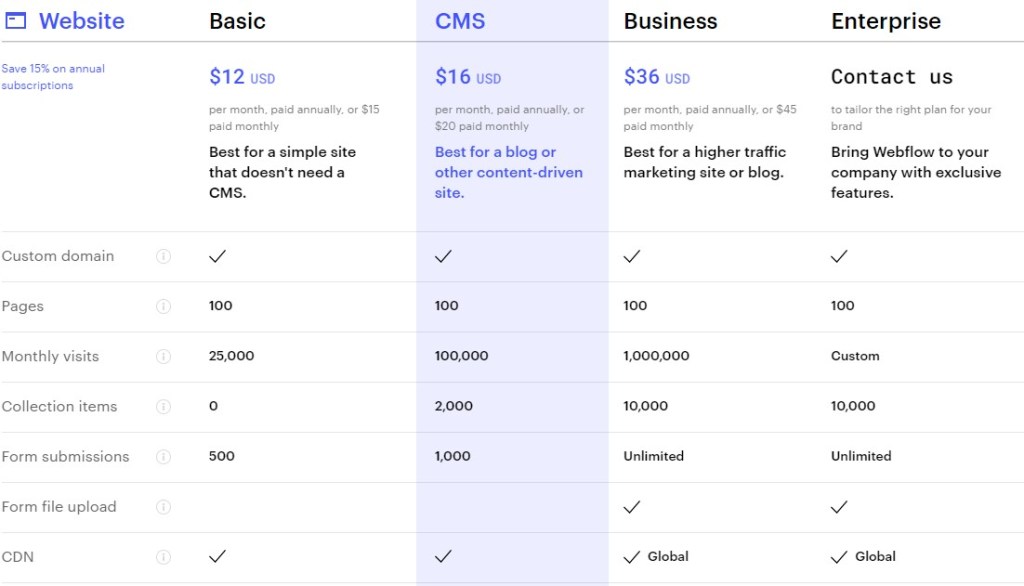
The Free plan helps you get started with the platform. Once upgrading to at least the $16/month plan, you have access to numerous additional advanced features.
18. Jekyll
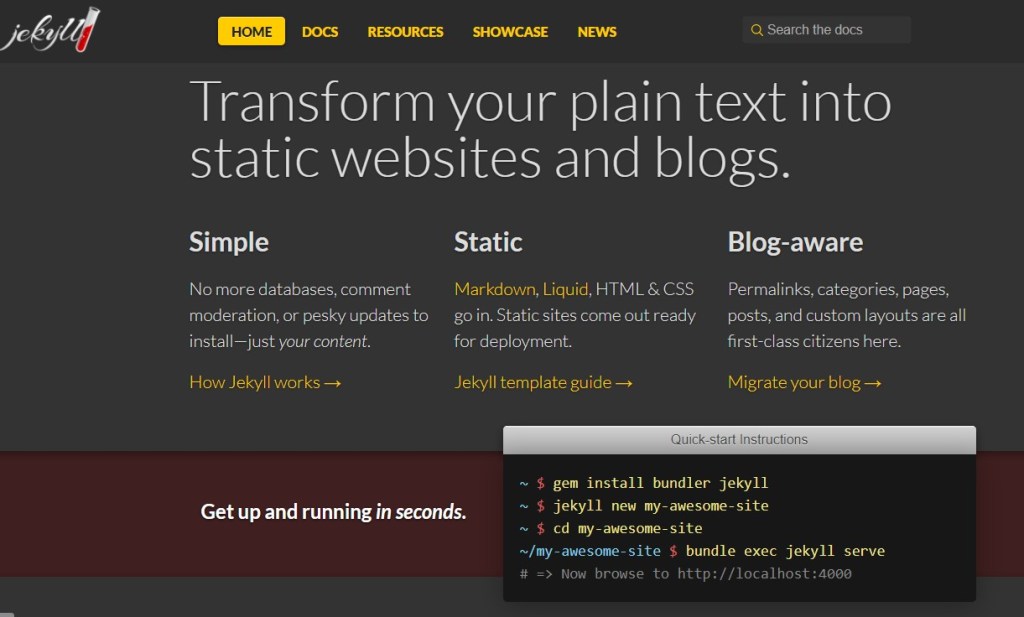
Jekyll is an advanced blogging platform used primarily by tech-savvy users and developers. It’s simple, reliable, and suitable for building static websites and blogs.
Key features
Since Jekyll is an open-source platform, you can pretty much design, customize, and extend your blog however you want.
The best part about Jekyll is that you can deploy your blog using GitHub with a completely free custom domain name.
Ease of use
Jekyll is for advanced users only.
Custom domain name
Associating a custom domain name is possible with Jekyll.
Monetization potential
You can monetize your blog with any methods you like as long as you know how to implement them.
Pricing
Jekyll is completely free to use.
Final Verdict: The best blogging platforms to make money
It’s hard to decide which blogging platforms to choose when there are just so many out there.
For that reason, let’s go through all the best of the best that can help you quickly set a money-making blog up and running.
The most versatile blogging platform to make money

Self-hosted WordPress is our pick for the most versatile blogging platform.
Despite being a little bit technical sometimes, the freedom, the capabilities, and the potential it possesses are worth investing your time and effort.
The most beginner-friendly blogging platform to make money

If you are not very fond of doing technical stuff, Wix is your perfect choice to build a blog.
Offering a powerful drag-and-drop page builder and many out-of-the-box tools, Wix helps you quickly create a beautiful blog and set it up properly to start making money.
The best free blogging platform to make money

Straightforward and simple to use, Blogger is the best free blogging platform that anyone can use to build a blog within minutes.
The honorable mention

Our honorable mention in this blog post is WordPress.com. Running with the core of WordPress, WordPress.com is for people who want to enjoy the power of the most popular CMS without having to worry too much about the installation, maintenance, and up-gradation of their blog.
Conclusion
It entirely depends on you to choose a platform to start a blog.
However, if you are serious about making money, an easy-to-set-up, easy-to-scale, and easy-to-monetize blogging platform is your go-to choice.
If you’re still unsure whether blogging is right for you, you can start a free blog on Blogger.com or WordPress.com. Then, as your blog grows, you can always switch to a paid platform like a self-hosted WordPress blog. Nowadays, most blogging sites provide the functionality to export your old content and import it to the new platform in just a few clicks.
Useful Resources
- Blog, Blogging, Bloggers, and Blog Posts: Have a look at the comprehensive definitions of blogs, blogging, bloggers, and blog posts.
- The definitive guide to making money blogging: Wonder how exactly you can make money blogging? Click the link to check out our definitive guide.
FAQs
Should I start a free blog to make money?
You can totally make money with a free blog as long as you have great content. However, please bear in mind that a free blogging platform comes with two main limitations. First, you have little control over your blog. Second, there are not many tools that can help you quickly set up monetization models. For those reasons, you might want to consider investing a little bit of money upfront, so you can build your own unique presence and have an edge in the blogging competition.
Which blogging platform should I choose to make the most money?
No matter which platform you choose, you can maximize your earning potential as long as everything is done right.
However, we still recommend you start a self-hosted WordPress because of its versatility and low upfront cost. There are also so many WordPress plugins that you can install to help you quickly get your blog up and running to make money.
Alternatively, you can choose to go with WordPress.com. Although the price is a little bit high, it provides many powerful tools out of the box without you having to install or purchase a third-party plugin yourself.
The rightful owner of The Clever Business. I review & curate the leading suppliers so you don't waste time scouring the internet.




